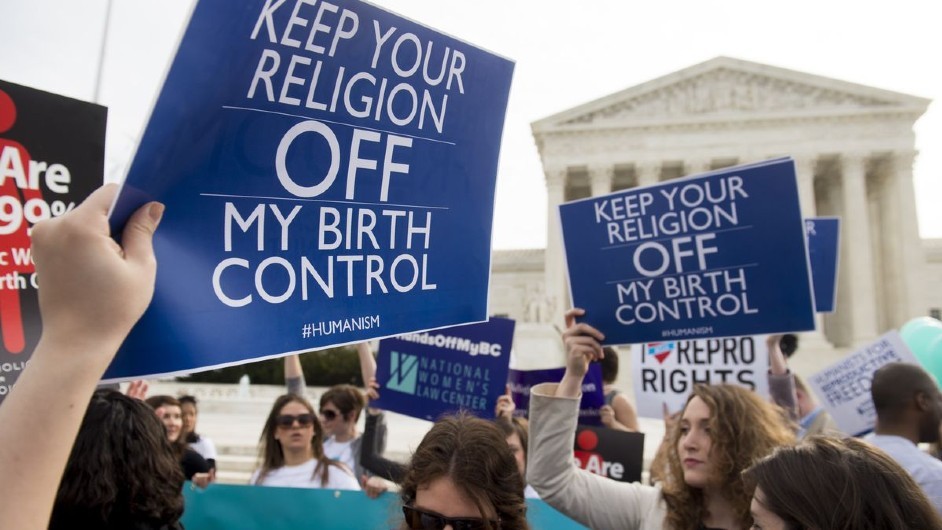Court Allows Employer Exemptions in ACA Birth Control Mandate
The ruling highlights a growing trend among the justices in which religious liberty supersedes other rights.

Today the Supreme Court decided two cases that elevate the rights of religious employers over the rights of employees to be free from workplace discrimination. These two decisions should be read together with the Court’s historic decision a few weeks ago on expanding federal employment non-discrimination protections to include sexual orientation and gender identity discrimination, an unexpected step of folding LGBTQ people into the sex discrimination protections in federal law.
Yet the ruling on these two cases undercut the significance of that decision by undermining the reach of federal employment discrimination laws for all employees, exempting potentially every employer from the sex discrimination protections in the Affordable Care Act (ACA) and giving religious employers unfettered discretion to decide which employees count as ‘ministers’ that are not covered by federal law.
In Little Sisters of the Poor v. Pennsylvania, the Court considered yet another faith-based challenge to the Affordable Care Act’s requirement that employer health plans include contraceptive coverage. The Court ruled 7-2 siding with the Trump Administration’s policy that exempted all employers, whether religious, secular, non-profit, or for profit, from including contraception in employee health plans if they had a religious or moral objection to doing so.
Justice Clarence Thomas, writing for five of the more conservative justices, affirmed the authority of the administration to broadly expand religious or moral exemptions from the ACA, and deflected a clear ruling on whether religious liberty principles required the government to issue such broad exemptions.
That said, Thomas laced his opinion with veneration for the Little Sisters and their faith-based mission, something that was not required by the legal reasoning he deployed. He noted that, in running nursing homes, the Little Sisters “feel called by their faith to care for their elderly residents regardless of ‘faith, finances, or frailty.’” In his closing opinion, he said: “For over 150 years, the Little Sisters have engaged in faithful service and sacrifice, motivated by a religious calling to surrender all for the sake of their brother. ‘[T]hey commit to constantly living out a witness that proclaims the unique, inviolable dignity of every person, particularly those whom others regard as weak or worthless.’”
SCOTUS Votes 7-2 Upholding Trump Administration's Contraceptive Policy
In the second case issued by the Court, Our Lady of Guadalupe School v. Agnes Morrissey-Berru, also a 7-2 decision, a teacher at a Catholic school sued her employer for age discrimination after she was fired on the grounds that she had “difficulty in administering a new reading and writing program.” The Court ruled that she could not sue the school for discrimination under a “ministerial exception” to federal anti-discrimination laws, because “the First Amendment protects the right of religious institutions to decide for themselves, free from state interference, matters of church government as well as those of faith and doctrine.”
This case expanded an earlier ruling on the “ministerial exception,” giving parochial schools great latitude to determine who is and is not a “minister,” and exempts them from anti-discrimination laws even if the decision to fire an employee was not in any way based in religious doctrine.
These cases illustrate something important about the Supreme Court’s approach to fundamental rights. When they are asked to adjudicate conflicts between religious liberty and other fundamental rights, they have consistently ruled that religious liberty supersedes other rights.
Deploying soaring rhetoric about the almost sacred nature of religion in American culture, they use technical, almost antiseptic reasoning when it comes to rights to equality or reproductive liberty. In so doing, the Court takes for granted the notion that the state has a compelling interest in protecting religious liberty while minimizing the history and value of laws that secure workplace equality or sexual rights.

Katherine Franke is the James L. Dohr Professor of Law at Columbia University, where she serves as the faculty director of the Law, Rights, and Religion Project. She is the author of Repair: Redeeming the Promise of Abolition.
This column is editorially independent of Columbia News.